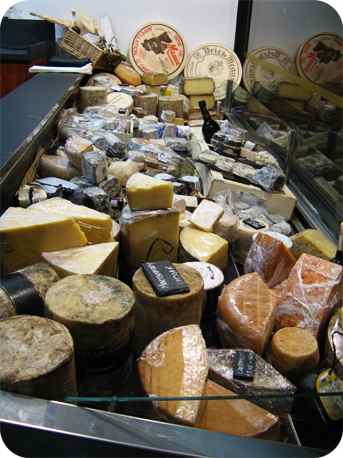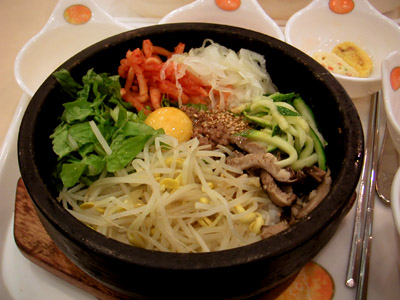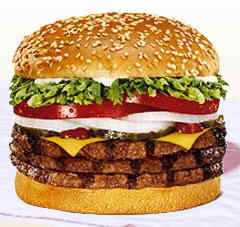Forget About Fat People. What about Fat Supermarkets?
Recently, there has been some coverage in the British press about the findings of a twenty year study into weight gain. The findings reveal that over 20 years the average weight of the population has increased by sixteen pounds. Further, it seems that rather than weight gain being the product of lazy people lacking will power, an approach the media and many of the moronic public have taken in their attempt to stigmatise and persecute the overweight, it is more the case that gradual changes in eating patterns, and what is available on shop shelves, over a long period of time, increase weight.
The speed at which Koreans are becoming fatter is quite alarming and while I only saw a few chubby kids 10 years ago, I now see obese Koreans on a daily basis. At the same time the girth of Koreans is expanding, changes are occurring in shops and you can almost see corresponding ballooning of Korean bellies as new foods are introduced. It is quite clear that obesity is a product not of sloth and ill-discipline, but the western-style diet which with its fried chicken, pizzas and burgers, has already made an impact on the Korean peninsula.
My local E-Mart used to have one frozen food chest cabinet the contents of which were not very enticing, mostly mandu, pork cutlet and ice cream. In the last few weeks the amount of frozen food has tripled and now includes numerous micorwave-able options such as black noodles, spaghetti Bolognese, garlic bread, curry and rice etc. For the first time, I saw a co-worker eating a microwave meal for dinner. I also notice the introduction of cheeses and butter both of which were formerly difficult to obtain. Now, Monterrey Jack, British Cheddar, Brie, Camembert and Gouda are all available plus Danish Lurpak butter. I wonder how long it will be before there are the 35 different types of butter and 46 different types of cheese I counted yesterday in the Waitrose in my hometown.

a British cheese counter probably contains more calories than the entire food section of a Korean supermarket
I have written before about the absence of tinned foods in Korea but no doubt their introduction, along with those enormous slabs of chocolate, almond, fruit and nut, Belgian white, Milky Bar etc, which will join the lonely double Snicker bar, are pending. Today, in my hometown Tesco’s One Stop, I counted 33 different brands of chocolate weighing between 125 and 250 gr per bar.
How the average person becomes 16 pounds heavier over 20 years ago ,(and the average weight is still increasing), is not rocket science. Along with an increasingly sedentary lifestyle and the many changes in what is available around us, the pounds gradually accumulate. The Big Mac and Whopper, former bulwarks of the fast food industry are now pathetic little things, dwarfed by subsequent generations of super and mega burgers. Burger King’s, triple Whopper with cheese packs 1250 calories, Hardee’s 2/3 pound Monster Thickburger contains 1320 calories along with a massive 3.20mg of sodium while the humble cheese burger has psychologically shrunk to the size of a coin and seems a positively healthy morsel by comparison.
In my last stint in Korea, my weight has not only dropped by some 20 kg, but I have managed to keep it off without any real effort. The goodies that tempt me back home simply don’t exist and a trip to the supermarket, even the largest, isn’t half the temptation it is back home. It seems quite apparent to me that the more westernized the Korean palate becomes, the fatter their girths expand.
Currently, there in an obsession with obesity and attacking the obese has become a form of entertainment. Forget fat people and focus on fat supermarkets! It is abundantly clear there is a link between culture and weight so much so that it is perhaps time we demanded our supermarkets produce statistics which reveal not just the percentage of fat and sodium in their food, but its average calorific value. If the weight of the average British person is rising it probably because the places where they shop for the bulk of their food is providing a greater range of items high in calories. And if you shop in a fat supermarket, or live in a fat society, it should hardly come as a surprise. Fat supermarkets make fat people!
Further references





If only cheese and butter did become cheaper and readily available in Korea. Last time I was there it was known, rather odiously, as ‘wine cheese’ as opposed to the local plastic cheese which is mostly vegetable oil and colour.
I found Koreans sweet tooth had strayed into mainstay food and drinks. Bulgogi was ever more sweeter, soju was much sweeter than I’d remembered too. Anything western tended to be overprocessed and……sweet. Sweet honey mustard, sweet pickles, and let’s not forget that ham and jam sandwich down at Buy The Way. This is what wetsern food is sold to Koreans as. When they come to England and discover Colmans mustard they buy up the whole shelf! (well, a Korean friend did anyway). Hamburgers can actually be really good if you make them at home and you can dispense with the sugar and limit the fat.
English supermarkets are a shock when you look at the packet. Since when did Canneloni need sugar as an ingredient? Don’t even go into frozen food supermarket Iceland.
Alas, fruit and veg have skyrocketed in both countries, Koreans don’t have a garden to grow anything and it’s much the case in built up areas of the UK too., no space (or no interest)
Iceland! Now there’s a class outlet. I once bought Iceland economy burgers, I was a student and broke; I mistakenly let them thaw upon which they mutated into a gross paste which was tinged green. When I subsequently fried them I noticed that they rapidly shrunk while the fat in the pan correspondingly deepend until the burgers were actually floating. At that point, I chucked them in the bin. And Iceland cakes and cheesecakes were hideously sweet.
“Alas, fruit and veg have skyrocketed in both countries”
I hear this from ex-pats, but I’m always blown away by how cheap produce is in a Korean market compared to an American one. I can get fresh cherry tomatoes, mushrooms, cucumbers, eggplant, and onions for about 1/5 of what you pay at a US supermarket.
And while I’m a big fan of gimbap, it’s not a very healthy option. (Rice = calories.) Better than a Big Mac, but I’m trying to snack more on raw fruits and unsalted peanuts these days.
Ahh, aging.
How many kimbap do you eat? I bought a rather boring one in a GS25, it lacked mayo or cheese and was 180 calories. Personally, I prefer one of the big Onigiri, samkak baps, preferably with tuna, cheese and flying fish eggs. As for vegetables in the UK, I bought a bag of spinach leaves (in a freaking bag like most vegetables are now), It cost the equivalent of 5000 Won and when blanched would have fitted in the palm of my hand. The two bunches I buy in Korea for a pound (2000 Won), will fill a large pot and last all week..
If I’m not having lunch with my boss or a co-worker I’ll usually snap up a couple of samgak-gimbap for lunch.
Again, I think snack food options are usually much better here than in the US (taquitos!), but I’m trying to make a habit of bringing fruit to work for lunch and/or snacks.
Cheese and butter are not the real culprit…In France, we traditionally eat cheese and butter on a daily basis (reasonably of course) but (till recently) people were skinnier and healthier than in the States. The real problem, as you outlined too, is SUGAR that is added to everything in the American diet. I am French living in Canada for 6 years now and I’m still always very surprised (and disappointed) by how sweet everything is. I went yesterday to a restaurant and EVERYTHING was more or less sweet: the so called cucumbers “vinaigrette” was sweet (would not have a pich of sugar in France) even the fries were sweet (though I guess the kind of potatoes were in cause there) and the dessert was overflowing with sugar killing the tatse of others ingredients… it is the same problem when I’m invited to friends place: there is generally a dislike of “sharp” tastes so people add sugar to tuned everything down, it seems.
The sugar companies are making a LOT of money….
Emma
Who eats butter ‘reasonably?’ Doesn’t everyone paste it on like I do? Yes, the sugar is something I didn’t focus on probably as I’m into savoury rather than sweet. Koreans tend to ruin pizzas with the sweet sauces. In the docu-movie ‘Food Inc’ much emphasis is put on the corn derivatives which are high in calories and used to bulk out an enormous range of foods. Thanks for your response.
Traveling home, i _really_ notice portion size as well. My sister and her family are big into exercise but jesus, I couldn’t believe how much food they prepared for an evening meal.
Leftovers are one thing, but they basically cook more stuff (chicken breasts, rice, pasta) than they could ever hope to eat unless they invited friends over to share.
They put it in the fridge and invariably it goes bad.
I’m no health maven, but it pains me to throw edible food away.
Korean markets are great, I’d forgotten how good they are when you get a good one you stick with who keep well-stocked. There are no markets in my part of SW London but Hounslow has some better deals at the Turkish market. Might take a suitcase next time.
But yes, the sugar……it’s truly everywhere. Or is it more of a corn syrup like Koreans use a lot eg in dak dori tang and those disgusting ‘caramel’ potatoes? Hell, I’d rather the world was going hell for leather with lard than sweetening everything
I think Kangwon-do food is very savoury. Not sweet like Seoul or sour like Cheolla-do. I think even the taste in peppers has changed from sharper to sweet.
It isn’t just the food with added sugar. It’s all the processed food. (Well, and for Americans, portion sizes are a problem, too).
The chemical ingredients now commonly used to process food to make it taste good cheaply and to preserve it, that’s all bad for you and confuses your body. I live in the States, but I often shop at a Korean supermarket. There’s exactly 1 brand of gochujang that I can buy. More and more grocery staples have those added chemicals (which I can’t eat not because I’m a food snob but because they are usually derived from corn, which I can’t have). This is all stuff that at one time, people would have made at home, but now nobody wants to spend the time on or has the time to spend. It’s so sad.
Every time I go to that store and look at the labels, I think, “well, it’s just a matter of time before South Koreans are as fat as we are.” I guess I was right. That’s just a shame.
Yes and no. Korean diets are definitely changing for the worse, but there’s also a strong public transportation and walking culture here.
As opposed to America, where some people literally never get exercise.
I am a former special education teacher and I wrote a children’s picture book that tackles the issue of childhood obesity. Hunka Chunka Monkey Shapes Up entertains children without being preachy. It places a simple truth as a foundation in their hearts…..to cut back on their favorite snack, become active and make new friends.
Chris Powell of ABC’s Extreme Makeover: Weight Loss Edition reads my book to his children every night. He stated on his FaceBook, “The kids are requesting Hunka Chunka Monkey Shapes Up for their bedtime story tonight….AGAIN! This is the third in a row, but I love it. What a great message of healthy living for children:). Nicely done, Sam E Bromley!” Chris’s wife, Heidi Powell, used such words as ‘amazing’ and ‘brilliant’ when describing my story! I am excited about getting this message out. You can go to YouTube.com and type in my book’s name: Hunka Chunka Monkey Shapes Up and see a brief message about my story! Please pass this on for all to see and partner with me and let us stop the obesity problem in America by encouraging the very young to skip, run and jump their way to a better life and a better future!
Sam E Bromley
http://www.hunkamonkey.com
sebnest@yahoo.com